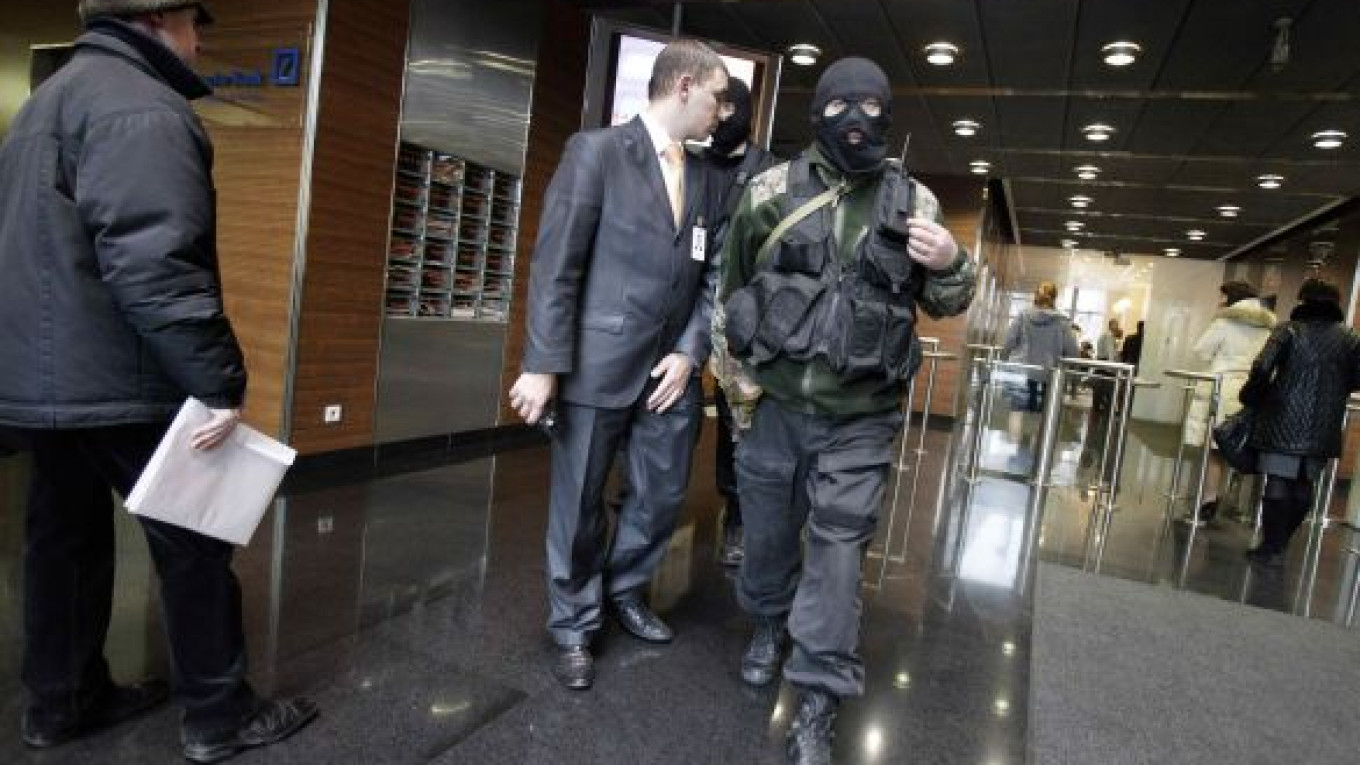Investigators raided Deutsche Bank offices in Moscow on Wednesday in the ongoing embezzlement case against fugitive State Duma Deputy Ashot Yegiazaryan.
The bank's offices at Sadovnicheskaya Ulitsa were searched in connection with the embezzlement case surrounding the Moskva Hotel, the Investigative Committee said in a statement.
Officers wearing balaclava masks and carrying automatic weapons joined investigators in their search.
The bank confirmed the raid but stressed that it was solely connected to a single client and a criminal case into alleged embezzlement during the reconstruction of the Moskva Hotel.
"This does not touch Deutsche Bank's business practices," the source said on condition of anonymity, citing company policy.
The bank said in an e-mailed statement that it was cooperating with the Investigative Committee as mandated by law.
Yegiazaryan, a secretive businessman and long-serving Duma deputy for the ultranationalist Liberal Democratic Party, has been at the center of a multimillion-dollar fraud case involving City Hall and some of the country's most prominent tycoons.
Investigators accuse him of embezzling more than $16 million from business partners for the reconstruction of the Moskva Hotel, a vast Stalin-era building located adjacent to the Duma building and the Kremlin, as well as other construction projects.
The Investigative Committee did not offer details about how Deutsche was connected to the fraud case, but said it had charged businessman Vitaly Gogokhia with embezzling $87.5 million from OEK Finans, a company owned by City Hall.
The sum matches exactly a $87.5 million loan from Deutsche Bank for the vast Moskva Hotel project. As collateral, the bank got a 51 percent stake in DekMos, the hotel's developer.
Gogokhia is a former aide to Yegiazaryan and acted as CEO of Dekorum, a company said to be controlled by the Duma deputy.
Dekorum owned 51 percent in DekMos, with the remaining 49 percent belonging to City Hall.
When the financial crisis struck in 2008, the bank demanded immediate repayment of the loan because of delays in the construction schedule, Vedomosti reported last year. City Hall then repaid the loan through its subsidiary OEK Finans.
The transaction triggered a fight among shareholders locked up in a complicated web of companies, resulting in the opening of a host of criminal investigations.
A year ago, a 25.5 percent stake in the hotel ended up in the hands of billionaire businessman Suleiman Kerimov, who paid some $100 million for it, Vedomosti said.
In return, Yegiazaryan accused Kerimov of forcing him to relinquish a 25.5 percent stake in the Moskva Hotel and sued him and other wealthy businessmen for $2 billion in damages.
No settlement has been reported in the cases, which were heard in courts in Cyprus and London.
But Yegiazaryan has seen his fortunes crumbling.
He was stripped of his immunity last fall after failing to return after the parliamentary summer recess, and investigators in November opened a criminal case against him, accusing him of large-scale fraud.
If convicted of fraud, Yegiazaryan faces up to 10 years in prison.
On Monday, the Basmanny District Court issued an arrest warrant and froze assets including $50 million in cash and an office building on the downtown Dayev Pereulok.
But Yegiazaryan, who has lived in the United States since at least September, has repeatedly claimed that the charges against him are fabricated by former business partners.
His spokespeople did not respond to requests for comment Wednesday.
Searches like Wednesday's are popularly known as "masky show" for the intimidating masks worn by investigators that bring back unpleasant memories for some investors of the more turbulent post-Soviet years when companies faced raids from tax inspectors or even law enforcement officials hired by rival businesses.
Moscow police investigators raided the headquarters of billionaire Alexander Lebedev's National Reserve Bank in November as part of what they called a probe into one of the bank's clients.
A rattled Lebedev asked Prime Minister Vladimir Putin to intervene and complained to prosecutors that the "masky show" had caused frightened clients to withdraw 1.5 billion rubles ($49 million) in the two days after a raid.
Deutsche Bank said Wednesday's raid had not affected its work.
"Deutsche Bank continues to operate as normal, delivering its full usual service to clients," the e-mailed statement said.
A Message from The Moscow Times:
Dear readers,
We are facing unprecedented challenges. Russia's Prosecutor General's Office has designated The Moscow Times as an "undesirable" organization, criminalizing our work and putting our staff at risk of prosecution. This follows our earlier unjust labeling as a "foreign agent."
These actions are direct attempts to silence independent journalism in Russia. The authorities claim our work "discredits the decisions of the Russian leadership." We see things differently: we strive to provide accurate, unbiased reporting on Russia.
We, the journalists of The Moscow Times, refuse to be silenced. But to continue our work, we need your help.
Your support, no matter how small, makes a world of difference. If you can, please support us monthly starting from just $2. It's quick to set up, and every contribution makes a significant impact.
By supporting The Moscow Times, you're defending open, independent journalism in the face of repression. Thank you for standing with us.
Remind me later.


